Getting cloudy or white glasses from the dishwasher? Don’t have any ideas to conquer this problem?
Well, this guide will focus on removing those unwanted marks and cleaning both the glasses and dishwasher.
We have listed some techniques on how to remove hard water stains from glasses in the dishwasher.
Plus, the guide includes some tips for preventing the hard water stain on glasses and the dishwasher.
Why Do Hard Water Stains Form on Glasses?
To prevent hard water stains from forming on glasses permanently, it’s worth understanding why this unwanted mark causes. Hard water stains form in the glasses because of the use of water that contains minerals like calcium and magnesium.
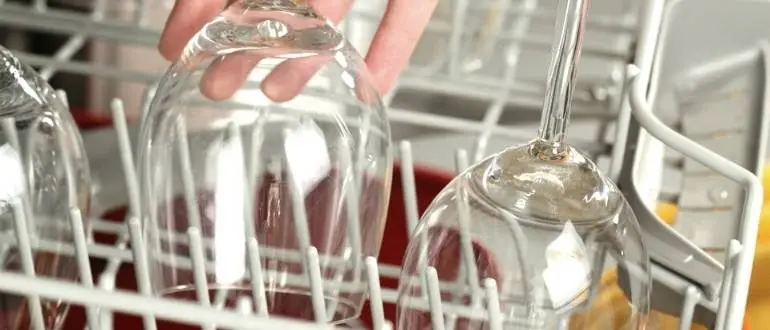
Some also call it limescale or mineral buildup. Using drinking water that includes an excessive amount of minerals can also cause white residue in the glass.
After using this water in the dishwasher to clean glasses, the water evaporates and leaves mineral deposits.
Even hard water doesn’t rinse properly like soft water, therefore leaving dirty water on the dishes. Applying too much detergent in hard water can only compound the rising issue.
Drying the minerals of hard water is another key reason for forming a cloudy film in the glasses.
To check for hard water, soak your glass in vinegar for 5 minutes, and if it removes the cloudy water, hard water is your enemy.
How to remove Hard Water stain from glasses in the Dishwasher?
Once you have noticed hard water stains in your glasses, there are multiple methods you can utilize to remove those unbearable signs and make the glasses spark clean.
Let’s start by checking some DIY methods, as the essentials required for these are commonly available at home and easily applicable.
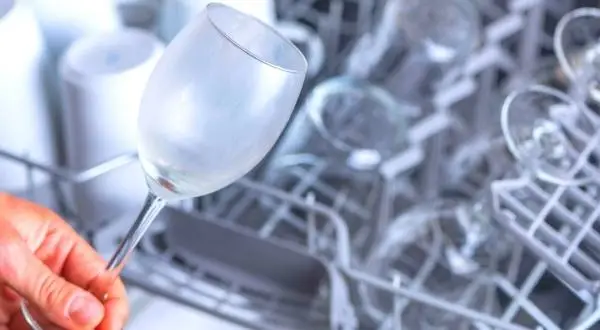
Baking Soda and White Vinegar Solution
The most effective way to remove hard water stains from glasses is to use a solution of white vinegar and baking soda.
Simply mix these two ingredients and prepare a paste. Then spread the paste over the stain on the glass and waist for around 10 to 15 minutes to let the paste break the limescale completely.
Finally, wipe off your glass with a wet cloth and enjoy your new-looking clean glasses.
Toothpaste with a toothbrush
Want to try the cheapest method to remove hard water stains from your glass? Try this toothpaste method.
Just apply some of your regular toothpaste on the glass and gently scrub with an unused toothbrush. Toothpaste will efficiently remove limescale and offer you a clean glass.
Vinegar and Soapy Water Solution
Vinegar has an acidic nature, making it effective for removing stains from glasses. Mix two cups of white vinegar in a bowl of warm water.
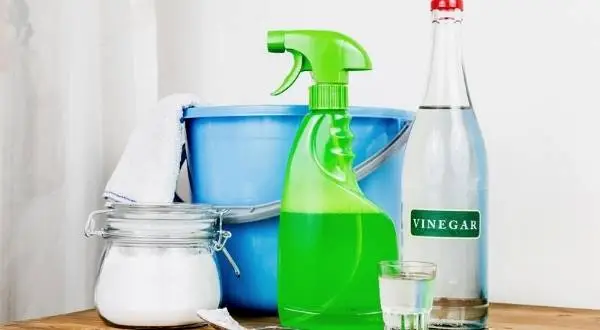
Then soak your glass in the water for around 25 to 30 minutes. Then scrub the glass gently using a sponge and rinse properly.
Lemon Juice with Water
Lemon can also help collapse the water stains as it has citric acid. To apply this method, first, make a solution of lemon juice and water.
Then soak the affected glass in it and wait for 5 minutes.
Then directly rinse the glass in clean water instead of greasing or scrubbing. Over time, you will discover the cloudy look is gone.
White Vinegar
Still, want to learn some more exciting tips on how to remove hard water stains from glasses in a dishwasher? Apply this white vinegar method.
This method will remove the hard water stain from your dishes, glassware, and dishwasher. Take a bowl of white vinegar in a dishwasher-safe cup and set it on the rack under the glassware.
Applying this method doesn’t require extra dish soap. After running the dishwasher, you won’t find any cloudy or stains on the glassware.
Finish rinse aid
If the stain on your glass is hard to remove with the above-mentioned method, then you should invest some money in finish rinse aid.
This rinsing agent can tackle both the limescale build-up and the cloudy glasses. So, after running the dishwasher, you will have sparkling glass, dishes, and utensils.
To apply this method, find the built-in liquid rinse aid dispenser in your dishwasher, which is generally located close to the detergent cups.
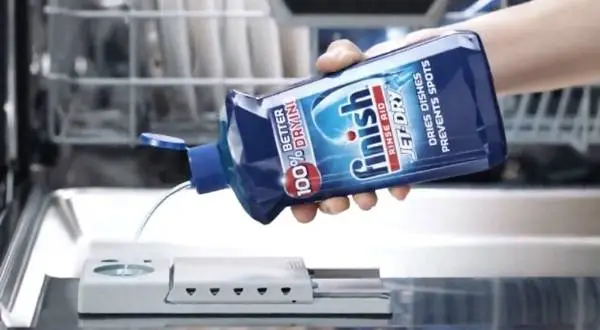
Fill the dispenser with your finished rinse aid and don’t let it overflow.
After running the dishwasher, this Finish Rinse Aid will automatically release in the rinse cycle to remove the stain on the glassware and deliver clean dishes.
Note: keep the dispenser of the finished rinse aid full. Check the dispenser every month and top it up if required. Otherwise, the dishwasher will blink a red light, which indicates the lower level of rinse aid.
How to prevent the buildup of hard water stains in a dishwasher?
It’s always worth taking a step to prevent forming any difficulties rather than solving them.
As you have learned how to remove hard water stains from glasses in the dishwasher, let’s focus on some pre safety tips to prevent them from forming:
A vinegar solution is handy for both removing and preventing stains from forming. Pour some white vinegar at the lower of the dishwasher and run a cycle.
Apply these tricks every two months to prevent mineral buildup in the dishwasher. A dishwasher generally includes a dishwasher salt container and an indicator light.
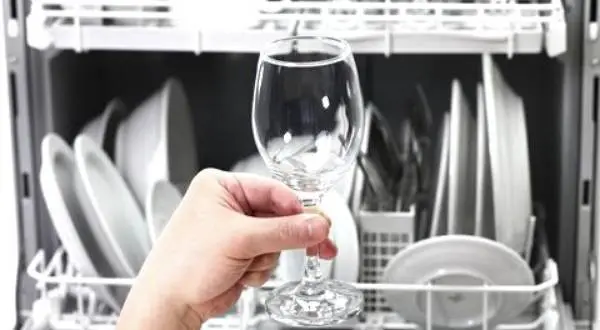
Keep the salt container full to prevent the indicator from lighting up as well as the mineral buildup. Some specially designed dishwasher detergents can handle stains.
Use these to remain safe from white streaks. An iron filter is also an easy yet effective way to remove iron and stains from water.
FAQs About Removing Hard Water Stains From Glasses In Dishwasher
Why do dishwashers deliver cloudy glasses?
The main reason for getting a cloudy glass from the dishwasher is using hard water or high mineral water.
The mineral water then dries on the glass surface and creates a cloudy film.
How to remove hard water stains from drinking glasses?
To remove hard water stains, soak your drinking glasses in white vinegar for around five minutes.
White vinegar is acetic and highly effective for dissolving minerals. If you still notice the stubborn spots, rub off the area with baking soda.
Where to place vinegar in the dishwasher to remove hard water stains from glasses?
Put some vinegar in a dishwasher-safe cup and set it in the top rack of the dishwasher.
It will help the vinegar reach the glassware properly and remove the stain marks.
Final words
Nothing is worse than getting cloudy glasses from the dishwasher when you expected sparkling results.
Instead of getting panicky, you must solve this problem. So learning how to remove hard water stains from glasses in a dishwasher will help maintain the dishwasher’s ability to get clean glassware.
Luckily, you can perform this maintenance task free of charge within minutes to restore the productivity of your dishwasher.

